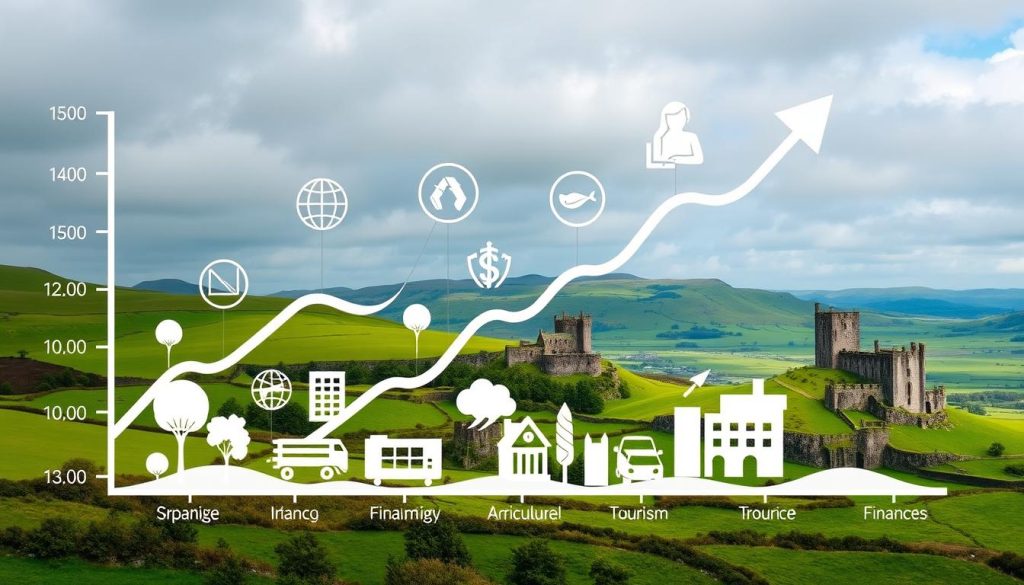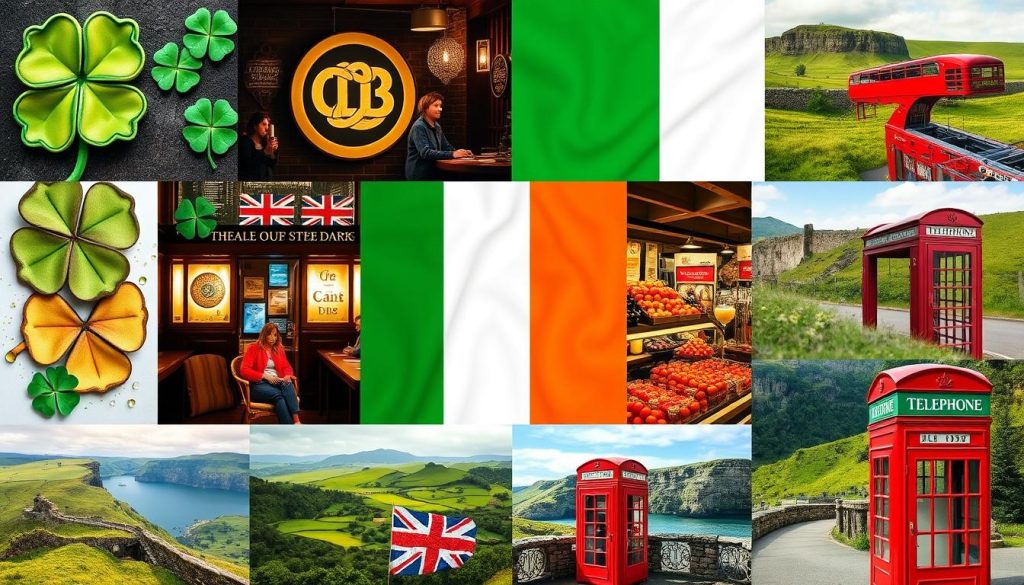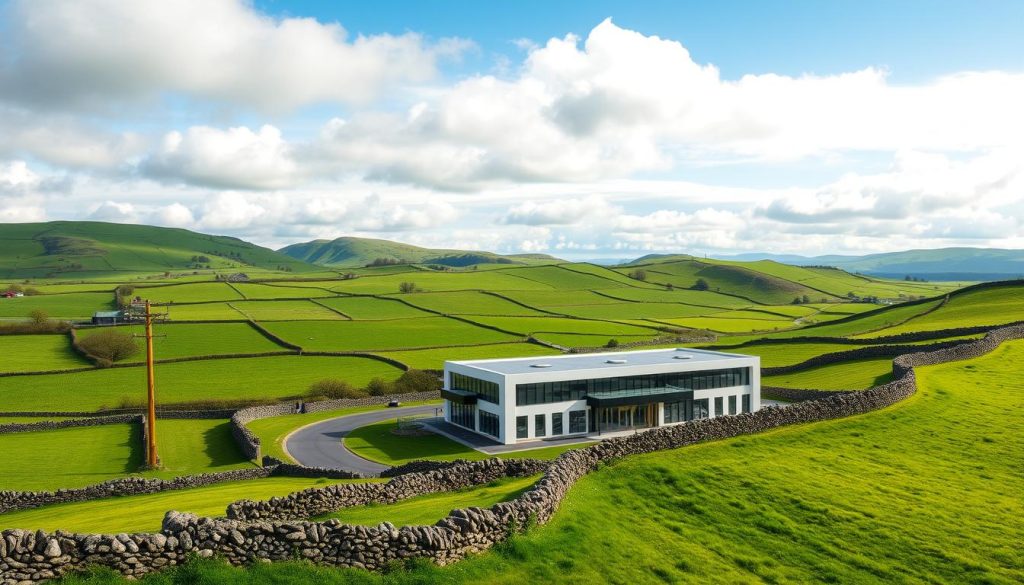UK entrepreneurs looking to grow their business should know about the Irish market. Ireland is a great place to do business, thanks to its location, skilled workers, and low corporate taxes. This guide will help you understand Ireland’s economy, so you can face challenges and find success.
- Understanding the Irish Market
- Legal Framework for Businesses in Ireland
- Doing Business in Ireland: Cultural Considerations
- Taxation and Financial Regulations
- Finding the Right Location
- Hiring Employees in Ireland
- Accessing Funding and Investment
- Navigating the Banking System
- Marketing Your Business in Ireland
- Building Relationships and Networking
- Challenges and Risks of Doing Business
- Utilising Technology in Business Operations
- Trade and Export Opportunities
- Business Etiquette in Ireland
- Future Trends in Irish Business Environment
This guide will cover key topics like legal frameworks, market trends, and cultural aspects. It’s all to help you succeed in this lively market.
Understanding the Irish Market

The Irish market is full of chances, thanks to strong economic signs and new trends. It’s key for UK businesses to know these things if they want to invest or grow here.
Key Economic Indicators
There are important economic signs that show how the Irish economy is doing now and might do in the future. These include:
- GDP Growth: The Irish economy is growing well, with a GDP increase of about 5.5% expected next year. This shows the market is strong.
- Unemployment Rates: Unemployment is going down, sitting at around 4.7% now. This means the job market is doing well.
- Inflation: Inflation is staying steady, forecasted at about 2%. This is good news for businesses in Ireland.
Industry Trends and Opportunities
There are exciting trends in Ireland’s industries, making it a great place for UK investments. Key areas to look at include:
- Technology: Dublin is becoming a big tech centre. There are lots of chances in software and fintech.
- Pharmaceuticals: Ireland is home to many global pharmaceutical companies. It’s a great place for research and making medicines.
- Renewable Energy: Ireland is focusing on green energy. There are good chances in wind and solar projects, encouraging new ideas and money.
Legal Framework for Businesses in Ireland

The legal setup in Ireland is strong for businesses looking to start or grow. It’s key to know the different business types to pick the right one for you. Each type affects how you’re seen legally, taxed, and what rules you must follow.
Business Structures Available
In Ireland, there are many business types for entrepreneurs. Here are a few common ones:
- Sole Trader: This is easy, letting one person run their own show with little red tape.
- Partnership: This is for two or more people working together. It’s important to write down who does what and who’s responsible.
- Limited Company: This is more formal, protecting the owners’ money. It’s good for growing businesses because it follows strict rules.
Company Registration Process
Setting up a company in Ireland involves a few key steps. Here’s what you need to do:
- Pick a unique name for your company that meets legal rules.
- Get your documents ready, like a memorandum and articles of association.
- Send in your application to the Companies Registration Office (CRO) with the right fees.
- After you’re registered, you’ll get a Certificate of Incorporation. This proves your company is officially there.
Doing Business in Ireland: Cultural Considerations

Knowing the cultural background is key to success in Ireland. Irish culture is steeped in history and tradition. This shapes how people interact and negotiate.
Communication in Ireland is friendly and direct. Humour and stories help build rapport. Being familiar with this style can make business talks smoother. Also, starting with small talk shows respect for personal connections.
English is the main language for business, but knowing Irish can strengthen ties, especially in rural areas. This shows the value of cultural awareness for UK businesses in Ireland.
Also, Ireland values punctuality and formality differently. Meetings start with casual chats and are flexible. Being patient and open-minded is crucial for success in Ireland.
Grasping these cultural subtleties can forge stronger bonds and boost UK businesses’ reputation in Ireland.
Taxation and Financial Regulations

Ireland’s tax system is very competitive, thanks to its low corporate tax rates. This makes it a great place for businesses to invest. It’s especially good for companies looking to save money and work efficiently.
Corporate Tax Rates
The corporate tax rate in Ireland is just 12.5%. This is very low compared to other European countries. It attracts many businesses, especially in tech and pharma. This rate helps companies plan their finances better, creating a stable business environment.
Value-Added Tax (VAT) Implications
VAT in Ireland is 23% for most goods and services. But, there are lower rates for some items. UK businesses in Ireland need to know about VAT rules, like when to register and how to comply.
Not following these rules can lead to fines. So, it’s crucial for businesses to understand VAT in Ireland. This ensures they operate smoothly and avoid any problems.
Finding the Right Location

Choosing a location in Ireland is key for any business wanting to succeed. The right spot can affect how easy it is to reach customers, how well your business runs, and your success overall.
When picking a location, consider these important factors:
- Proximity to Key Markets: Being near customers and suppliers cuts down on transport costs and improves service.
- Infrastructure: Good transport, communication, and utilities are vital for smooth operations.
- Availability of Talent: Places with lots of skilled people make it easier to find and keep employees.
- Cost Considerations: Costs vary across Ireland, like in Dublin, Cork, and Galway, for renting, taxes, and living.
Thinking carefully about these points helps make a smart choice for your business location in Ireland. It sets the stage for growth and lasting success.
Hiring Employees in Ireland

When you’re thinking about hiring in Ireland, it’s crucial to know the employment laws. These laws protect both employers and employees. They cover things like contracts, wages, and work conditions.
Understanding these rules helps make hiring easier. It also makes the workplace better for everyone.
Understanding Employment Laws
Employment laws in Ireland set the rules for employers and employees. They include:
- Minimum wage rules to keep workers’ earnings safe.
- Rules for leave like maternity, paternity, and annual leave.
- Clear contracts to outline job duties.
- Health and safety rules for a safe workplace.
Following these laws helps avoid problems and keeps the workplace fair. Employers should check their practices often to make sure they’re up to date.
Recruitment Strategies
Good recruitment in Ireland means using different ways to find the right people. Businesses can improve their hiring by trying these methods:
- Working with recruitment agencies to find the best fit.
- Using local job boards to reach more candidates.
- Starting referral programmes to get employee recommendations.
- Sharing company culture and values online.
Using these strategies helps employers find the best team. It makes their workforce strong and ready to achieve goals.
Accessing Funding and Investment

Businesses in Ireland have many ways to get funding. There are government grants and venture capital options. These help local businesses grow.
Government Grants and Support
There are many government grants for businesses in Ireland. These grants focus on certain sectors or areas. For example, Enterprise Ireland helps with innovation, research, and growing globally.
Businesses can get help with:
- Research and development grants
- Training and skill development incentives
- Financial assistance for export-oriented enterprises
Using these grants can help reduce costs. It lets businesses invest in growth areas.
Venture Capital Opportunities
The venture capital scene in Ireland is growing. Many firms want to back promising startups. This investment helps new tech and services grow.
Startups can improve their chances by:
- Going to networking events and competitions
- Working with accelerators and incubators
- Getting advice from industry experts
Getting venture capital can help businesses grow. It lets them expand and reach more markets. Knowing about these options is key for financial planning in Ireland.
Navigating the Banking System

The banking system in Ireland is key for businesses. It offers many financial services. Several big banks are there, helping companies of all sizes.
Key services include:
- Business accounts for daily transactions
- Credit for growing your business
- Loans for specific needs
- Merchant services for payments
Starting a business account is easy but needs some documents. You’ll need ID, business details, and financial statements. Knowing what each bank wants helps a lot.
Keeping cash flow smooth is vital. Online banking makes this easier. It lets businesses check finances and make transactions quickly.
Ireland’s financial system has many support options. This includes getting credit and loans. Talking to bank reps and knowing what they look for can help get the funds needed for growth.
Marketing Your Business in Ireland

To succeed in marketing in Ireland, you need a plan that speaks to local people. Knowing what they like and value can make your message stronger. Using both local and digital marketing strategies is key to building a strong connection with your audience.
Local Marketing Strategies
Connecting with Irish people is crucial. Here are some ways to do it:
- Supporting local events and charities to get noticed.
- Using radio and local newspapers to reach more people.
- Working with local influencers to gain trust.
- Running special deals during local festivals to boost interest.
Digital Marketing Best Practices
Digital marketing is vital for reaching people today. Here’s how to do it well:
- Improving your website’s search ranking to show up in local searches.
- Creating engaging social media content that people can relate to.
- Building strong customer relationships through targeted emails.
- Adapting your content to include local references, making it more appealing to Irish consumers.
Building Relationships and Networking

Networking in Ireland is key to building strong business ties. Making connections in the local business scene can open doors to partnerships and growth. It also boosts your business’s visibility.
Going to local events is a great way to network. Business conferences, trade shows, and meetups let you meet people face-to-face. You can share ideas and find common interests. These events are full of important people to meet.
Being part of business groups can also help. Groups like the Dublin Chamber of Commerce offer chances to meet and work together. They also provide access to useful resources. Joining these groups can lead to valuable connections for your business.
Using online platforms like LinkedIn is smart too. A good LinkedIn profile and active group participation can increase your visibility. Sharing your knowledge and insights can make you a leader in your field. This attracts potential partners and clients.
Challenges and Risks of Doing Business

Starting a business in Ireland comes with its own set of challenges and risks. It’s important to know these to succeed in this market. Economic ups and downs, along with political stability, play a big role in business. Cultural differences can also make things complicated.
Economic and Political Risks
Economic stability is key for any business. Ireland’s economy can change due to global trends and local policies. Political shifts, like Brexit, add more uncertainty. This affects trade and rules, making it harder for businesses.
Cultural Misunderstandings
The Irish business scene is full of cultural subtleties that can lead to misunderstandings. Companies might struggle with communication, teamwork, and client relations. For instance, Ireland’s casual way of talking can confuse outsiders. It’s vital to grasp local customs to avoid these issues.
Utilising Technology in Business Operations

Technology is key for making businesses run better and stay ahead in today’s world. In Ireland, many companies are using digital tools to make things smoother, cut costs, and please their customers more.
There are many software options out there for different needs. These tools help with talking to each other, managing projects, looking at data, and keeping in touch with customers. By using these technologies, businesses can get ahead and work more efficiently.
Automation tools are very important for making things better. They help with things like keeping track of stock, sending out bills, and running marketing campaigns. This lets businesses focus on big plans instead of small tasks. It’s all part of Ireland’s push towards digital change, encouraging new ways of doing things.
Cloud-based services have changed how businesses work. They offer flexibility, growth, and safety, helping companies manage better. With more people working from home, thanks to recent events, strong technology is more important than ever.
As the digital world keeps changing, it’s vital for businesses to keep up. Using digital tools not only improves how things work but also helps companies succeed in Ireland and worldwide.
Trade and Export Opportunities

Irish businesses have many trade opportunities to explore. The export market is wide open, with many industries ready to grow globally. To succeed, it’s key to know the export rules well. Following these rules helps businesses grow while staying legal.
Export Regulations to Consider
Exporting requires understanding certain rules for Irish companies. Important rules include:
- Licensing needs for some products.
- Customs duties and tariffs on shipments abroad.
- Health and safety rules for food and farm products.
- Trade deals that change market access.
Following these rules makes transactions smoother. It also helps build trust with global partners.
Key Export Markets for Irish Businesses
There are many Irish export markets with great potential. Some top markets are:
- United States – A big market for medicines and tech.
- United Kingdom – A good place for Irish food and drinks.
- Germany – A key spot for tech and engineering exports.
- China – A growing market for farm products.
Each market is different, so businesses need to plan carefully. Taking advantage of these opportunities can really boost sales and market share.
Business Etiquette in Ireland

When you deal with Irish businesses, knowing the local norms is key. Start by being polite with greetings like a firm handshake and direct eye contact. It’s also important to introduce yourself and others in social settings.
Being on time for meetings is a big deal. Showing up on time shows you respect others’ time. Meetings often start with small talk to build personal connections. It’s vital to listen well and show real interest in what others say.
In negotiations, being clear and open is important. Irish businesspeople value honest and straightforward talks. Building trust takes time, so patience is crucial. Listening well and addressing concerns openly helps achieve success.
Don’t forget the importance of social interactions. Talking about culture, history, and local interests can help connect you. Showing you care about Irish culture can also improve how you’re seen professionally.
Future Trends in Irish Business Environment
The Irish business scene is changing, with a focus on sustainability and innovation. This mirrors a worldwide move towards more eco-friendly business practices. Companies now see environmental awareness as key to their success, not just a legal requirement.
This focus on green initiatives is winning over customers. It’s also drawing UK entrepreneurs who want to invest in a market that cares about the planet.
Changes in how people shop will also shape Ireland’s business future. With more people using digital platforms, businesses need to keep up. They must use advanced data and customer tools to understand and serve their customers better.
This ensures they stay ahead in a rapidly changing market.
The blend of technology and traditional industries is opening up new opportunities in Ireland. Advances in AI and automation can make businesses more efficient and productive. UK entrepreneurs will find a welcoming environment in Ireland, where they can work together and innovate.
This collaboration will help shape the future of business in Ireland.

